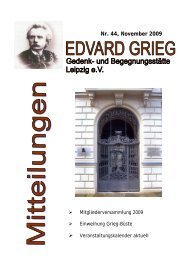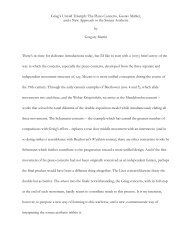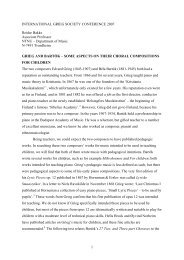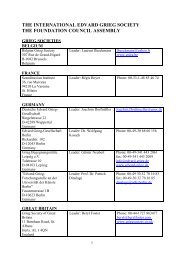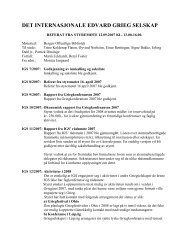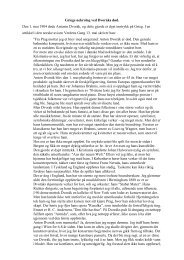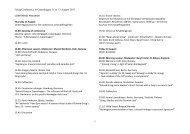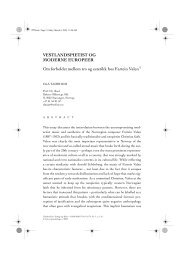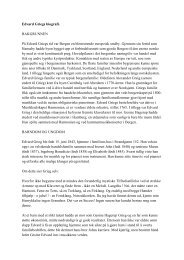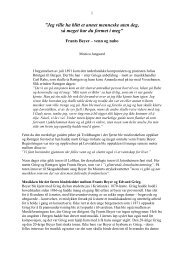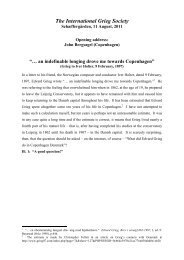Gregory Martin - paper 2007 - Grieg Society
Gregory Martin - paper 2007 - Grieg Society
Gregory Martin - paper 2007 - Grieg Society
You also want an ePaper? Increase the reach of your titles
YUMPU automatically turns print PDFs into web optimized ePapers that Google loves.
a form generically reflective of it—the Ballade belongs as much or more-so with the<br />
sagas and Eddas than it does with Chopin’s examples. 18<br />
But, as <strong>Grieg</strong> well knew, writing a saga and espousing its characteristics means<br />
more than simply formal procedures; there are vital aspects of genre at issue, among<br />
which are epic notions of time and duration, the role of the narrator/storyteller (an<br />
element introduced in the text—“I now attempt to write a song”), and the air of austerity<br />
prevalent in such tales. The last of these is perhaps the most subjective in its evaluation; it<br />
relates both to the vocabulary used—for the language of the epic is indivisible from its<br />
story—and ties in with perceptions of how Nordic landscape is reflected in <strong>Grieg</strong>’s<br />
music. I will not attempt to investigate this quality here; it is a familiar enough trope, and<br />
has been explored thoroughly elsewhere. 19 Suffice it to say that pianist Sviatoslav Richter<br />
spoke for not a few of us when he said: “in my own view he’s [<strong>Grieg</strong>] essentially an<br />
austere individual, like the landscape and nature of the North.” 20<br />
The epic as a genre cannot be separated from the great gulf of time implied, by its<br />
very nature, between ‘then’ and ‘now.’ Aristotle noted that “its action has no fixed limit<br />
of time.” M.M. Bakhtin elaborated on this quality in The Dialogic Imagination: Four<br />
Essays, where he posits that “a national epic past—in Goethe’s and Schiller’s<br />
18 While James Parakilas does credit <strong>Grieg</strong>’s Ballade with being “a new venture—within the piano ballade<br />
tradition—in suggesting both the form of the song and the progression of the story (pg. 159),” he fails to<br />
recognize <strong>Grieg</strong>’s reasons for doing so (poetically and formally), and as a result, I believe, does not<br />
evaluate the work appropriately in terms of intent, proportion, or design.<br />
19 See, for example, Daniel Grimley, <strong>Grieg</strong>: Music, Landscape and Norwegian Identity (Rochester: Boydell<br />
Press, 2006).<br />
20 Sviatoslav Richter, in Bruno Monsaingeon, Sviatoslav Richter: Notebooks and Conversations, trans.<br />
Stewart Spencer (London: Faber, 2005), 319-20.<br />
8



